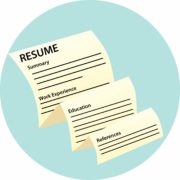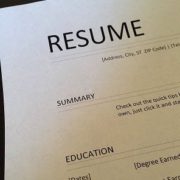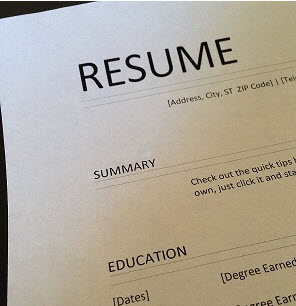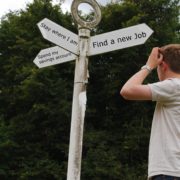Check out my recent article for The Student Affairs Feature titled “Making Your 1st Impression Count: 3 Steps to a Better Resume.” If you’re not in the field of student affairs this article is is still for you and will give your resume and cover letter an edge on the competition.
We have all heard the saying, “You only have one chance to make a first impression.” This could be in reference to the first time you meet someone or when you are introduced at an interview. You might not think it, but when applying for a job your first impression is actually your cover letter and resume.
You do not have much time to make a good first impression. Recent studies state that recruiters spend as little as six seconds reviewing resumes (The Ladders, 2012; BeHiring, 2013). In truth, those reviewing resumes are scanning, not reading, your materials. With just under 1,000 candidates attending The Placement Exchange last year it is imperative that you make a good first impression. How are you going to stand out? If your resume and cover letter fail to make a strong first impression the odds of you being invited for an interview diminish greatly. Your first priority is to make your application review as easy as possible for reviewers. Provided are three steps to ensure your resume and cover letter make a great first impression.
Your resume and cover letter must be without error.
In mid-2012, CareerBuilder released a study of 2,298 nationwide hiring managers. In part, the study determined common mistakes for jobseekers to avoid. According to the study, the number one reason (61 percent) to dismiss a candidate from consideration was a resume with typos.
Tip #1 – Have someone proofread your resume and cover letter. I know – this something you have heard before. Yet, do you know how many people still do not find someone to review their application materials?
Choose someone who has experience evaluating resumes and cover letters.Do not choose a parent, friend, or supervisor simply because they are willing to help. Ask yourself, “What makes them qualified to evaluate your materials?”
Do not ask too many people as you will get just as many answers. For every person you ask to proofread your resume and cover letter you are going to receive several different opinions. The first person might suggest making your font size smaller, while the second person might tell you it should be larger. Ask each person who reviews your resume to look for something specific. Remember, this is your application. It is your first impression. Those you are asking to help are providing suggestions – you do not need to take their advice.
Spend some money to have your resume and cover letter reviewed. This might sound like a waste as you can have this done for free, but hiring someone could have huge benefits in the long run. People you pay for these services have more of a vested interested in your application as you are paying them to do so. They will give you an added advantage. Depending on who you hire, this service can range in price. Look around, do your research, and find someone who fits into your price range and has experience in your field.
Check for grammatical and spelling errors. I cannot tell you how many times an applicant does not get a second look from a search committee because they have errors on their resume and cover letter. One grammatical or spelling error is one too many.
Use your space efficiently. Is there too much white space on your written materials? Are you wasting precious space on your resume where you could add skills? For example, the most common mistake I see is the right side of the paper on the resume is not utilized effectively. Consider using bullets and columns on your resume to fill in the space. Fill in your sentences so they take up the entire line if you are using bullets.
Your resume and cover letter must match the announcement.
Both your resume and cover letter must be specific to the position you are applying for. Individuals or teams who review resumes can spot a generic resume at first glance. If you are applying for three different jobs then you should have three different resumes and cover letters. I know this seems tedious, but it will increase your chances of getting an invitation to interview. Put the time and hard work in, craft your resume and cover letter to the specific job announcement, and standout!
Tip #2 – Make it clear on your cover letter how your knowledge, skills, and abilities meet the required and preferred qualifications for the position. This is basic, yet most people miss this idea completely.
Bullet points work best. On your cover letter list out how you meet all positional qualifications. List these in the same order as the job announcement. This makes it easy for the evaluator to see that you are qualified. They should have no need to look at your materials and guess whether you are qualified. List the information on the first page of your materials.
Elaborate on your resume. Once it is obvious that you meet all the requirements, use your resume to document and elaborate on the required and preferred qualifications for the position. Sell yourself and show how qualified you are.
Give your proofreaders the job announcement to review with the matching resume and cover letter. Why have them read your materials without understanding what you are applying for? Someone who has expertise in resume and cover letter review will ask you for this every time. Ask them to ensure that your materials are tailored to the job qualifications of the position.
Avoid common mistakes.
The objective statement. Get rid of the objective statement. Everyone knows you are interested in the position because (wait for it)… you are applying for the position! You do not need to restate that your objective is to obtain the respective position. This is not only a waste of space, but a waste of prime real estate on your resume (the top of the resume just below your contact information).
Tip #3 – Use a “Profile” section instead of an objective statement. Included in this section is a sentence or two on your expertise or time in the field. I also include a two-column bulleted list of my areas of expertise. This list may change or grow depending on the skills needed for the position I am applying.
Not contacting your references. I cannot tell you how many people do not ask individuals if they will be a positive reference. No matter how much you think they will serve as a positive reference, you need to check.
Tip #4 – Only list positive references. Contact each of your references and ask them, “Will you be a positive reference for me?” When it is time for reference checks, touch base with your references again and send them the position description. This will allow them to prepare examples of how great you will be in the position. Furthermore, do not end your resume with “References available upon request.” Rather, include them on an additional page and attach them to your resume.
Listing each positions’ responsibilities. Many applicants simply document their job responsibilities from previous positions. While it is important to show perspective employers what you have been responsible for in the past, it does not show what you have accomplished.
Tip #5 – Your resume is the perfect opportunity to sell yourself. For each job you have had, ask yourself the following question: “What are my top three accomplishments during my time in this position?” With each position, focus on the value you provided to your department or division. Be specific in your answer and include data. Think about how it might relate to the position you are applying for.
Remember the resume and cover letter are your first impression and the goal is to get you an interview. It should demonstrate that you meet the requirements of the position and have the skills necessary to succeed. It should also leave those evaluating your written materials thinking, “I need to meet this person. Yes, I want to interview them!” Yet, so many job seekers do not realize its importance. Follow the tips above and you will increase your chances of success!
CONGRATS to MEGAN CALE
for winning the FREE resume/cover letter polish and phone consult.
I am giving away a FREE resume and cover letter polish and a 30 minute phone consultation to one lucky winner. A +$200 value! Contest ends at 11:59pm EST on February 24, 2014. To Enter:
- Subscribe to my blog
- Like my Facebook page.
- Update your Facebook or Twitter with the follow: “I just entered to win a FREE resume/cover letter polish from @chrismmullen blog http://chrismullen.org/” [TWEET THIS]
[reminder preface=”Question: “]What’s your best resume and cover letter tip?






